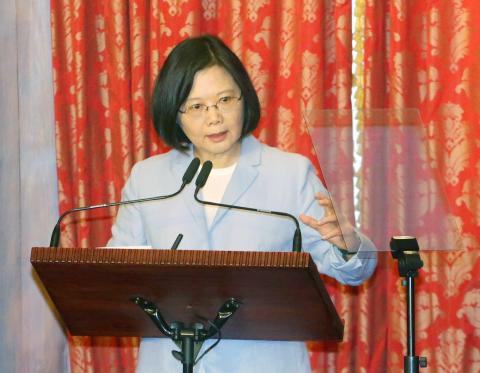President Tsai Ing-wen (蔡英文) yesterday reiterated the importance of dialogue in cross-strait relations and regional stability, pledging to continue the government’s efforts to maintain stable ties with Beijing.
“With regard to cross-strait ties, I must stress once again the importance of maintaining the status quo. Our goal is to establish ties with Beijing that are consistent, predictable and sustainable under the current constitutional system,” Tsai said during a tea gathering with the media in Taipei.
She said that despite China’s continued suspension of official cross-strait communication mechanisms, there have still been different levels of interactions between both sides of the Taiwan Strait.

Photo: CNA
Expressing hope that both sides would have suggestions on how to engage in dialogue after their relations become stabilized, Tsai said it requires a joint effort from both Taipei and Beijing and that it is a shared responsibility.
“In my inauguration speech on May 20, I did my utmost to close the gap between our stances. I have also endeavored to maintain the stability of cross-strait ties in the past three months,” she said.
Beijing has halted exchanges with Taipei due to Tsai’s refusal to officially recognize the so-called “1992 consensus,” which refers to an alleged understanding between the Chinese Nationalist Party (KMT) and the Chinese government that both sides of the Taiwan Strait acknowledge there is “one China,” with each side having its own interpretation of what “China” means.
Tsai said her attitude toward cross-strait ties and regional stability has been consistent and involves avoiding misunderstandings and supporting continuous communication with concerned nations.
Civic and semi-official interactions are also encouraged, Tsai said, adding that she has adopted the same attitude toward other countries in the region.
As for the pending appointment of a new Straits Exchange Foundation chairman, Tsai said her administration is still in the process of gauging the willingness of people on the short list to assume the post and that a final decision is to be made in the near future.
Asked to elaborate on the requirements for the head of the foundation, Tsai said it should be someone respected and trusted by the public.
Responding to a reporter’s question on the territorial disputes in the South China Sea, Tsai said the government has endeavored to maintain stability in the region following the ruling by the Permanent Court of Arbitration in The Hague, the Netherlands, on July 12.
“We understand that people want to see more action from the government on the South China Sea issue,” Tsai said.
However, she declined to respond directly to questions as to whether she plans to personally visit Itu Aba Island (Taiping Island, 太平島), the largest island in the Spratly Islands (Nansha Islands, 南沙群島), which has been administered by Taiwan since 1956.
Itu Aba was categorized as legally a “rock” instead of an “island” by the tribunal, prompting calls for the Tsai administration to take action to safeguard the nation’s sovereignty over the feature.

Conflict with Taiwan could leave China with “massive economic disruption, catastrophic military losses, significant social unrest, and devastating sanctions,” a US think tank said in a report released on Monday. The German Marshall Fund released a report titled If China Attacks Taiwan: The Consequences for China of “Minor Conflict” and “Major War” Scenarios. The report details the “massive” economic, military, social and international costs to China in the event of a minor conflict or major war with Taiwan, estimating that the Chinese People’s Liberation Army (PLA) could sustain losses of more than half of its active-duty ground forces, including 100,000 troops. Understanding Chinese

The Ministry of Foreign Affairs (MOFA) yesterday said it is closely monitoring developments in Venezuela, and would continue to cooperate with democratic allies and work together for regional and global security, stability, and prosperity. The remarks came after the US on Saturday launched a series of airstrikes in Venezuela and kidnapped Venezuelan President Nicolas Maduro, who was later flown to New York along with his wife. The pair face US charges related to drug trafficking and alleged cooperation with gangs designated as terrorist organizations. Maduro has denied the allegations. The ministry said that it is closely monitoring the political and economic situation

UNRELENTING: China attempted cyberattacks on Taiwan’s critical infrastructure 2.63 million times per day last year, up from 1.23 million in 2023, the NSB said China’s cyberarmy has long engaged in cyberattacks against Taiwan’s critical infrastructure, employing diverse and evolving tactics, the National Security Bureau (NSB) said yesterday, adding that cyberattacks on critical energy infrastructure last year increased 10-fold compared with the previous year. The NSB yesterday released a report titled Analysis on China’s Cyber Threats to Taiwan’s Critical Infrastructure in 2025, outlining the number of cyberattacks, major tactics and hacker groups. Taiwan’s national intelligence community identified a large number of cybersecurity incidents last year, the bureau said in a statement. China’s cyberarmy last year launched an average of 2.63 million intrusion attempts per day targeting Taiwan’s critical

AGING: As of last month, people aged 65 or older accounted for 20.06 percent of the total population and the number of couples who got married fell by 18,685 from 2024 Taiwan has surpassed South Korea as the country least willing to have children, with an annual crude birthrate of 4.62 per 1,000 people, Ministry of the Interior data showed yesterday. The nation was previously ranked the second-lowest country in terms of total fertility rate, or the average number of children a woman has in her lifetime. However, South Korea’s fertility rate began to recover from 2023, with total fertility rate rising from 0.72 and estimated to reach 0.82 to 0.85 by last year, and the crude birthrate projected at 6.7 per 1,000 people. Japan’s crude birthrate was projected to fall below six,